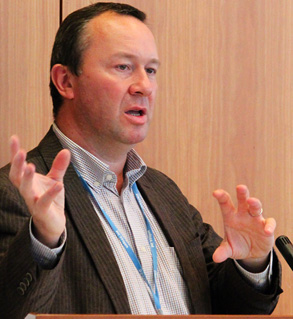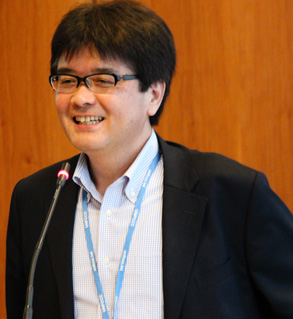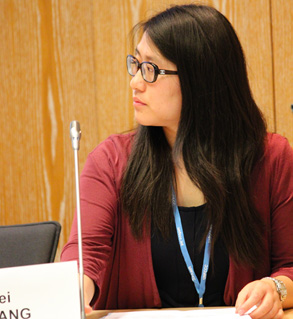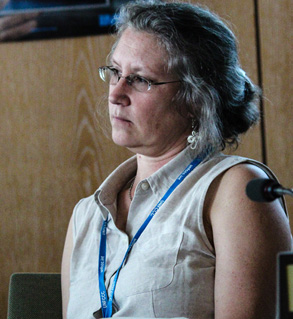|
|
 |
 |
 |
 |
 |
| Etienne Coyette, European Commission, said is it impossible to have a one-size-fits-all approach to adaptation projects, given the diversity of vulnerabilities. |
|
 |
 |
 |
 |
|
|
|
Moderator Josef Haider, KfW Development Bank, noted this event addresses the need for knowledge management in adaptation by exploring various approaches to funding adaptation and scaling up project activities. He encouraged those present to “dare to make mistakes” in this new territory.
Etienne Coyette, European Commission, stressed that adaptation is about building resilience and is almost impossible to separate from development approaches. He highlighted support to pilot programmes on: ecosystem-based approaches; climate-smart agriculture; and adaptation mainstreaming into country systems. He noted that debt swaps for adaptation could be an interesting avenue to redirect funds for adaptation.
Britta Horstmann and Günther Schulz-Heiss, German Development Institute, reported preliminary research results on the possible role of Social Investment Funds (SIFs) for adaptation finance. Horstmann said SIFs are well placed to deliver on guidelines of adaptation finance, including: targeting vulnerable groups; distributing funds effectively and efficiently; applying country-driven approaches; and integrating numerous sources of finance.
Alexis Bonnel, Agence Française de Développement, presented the Bank’s experience, noting a very steep learning curve. He reported a commitment of over €1.6 billion during the last five years, focused on the water sector, generating numerous co-benefits. In addition to specific projects, Bonnel outlined methodological work undertaken, inter alia: definition of adaptation; procedures and tools for climate proofing; and risk classification schemes.
Florian Wieneke, KfW Development Bank, reported that waste and water, and forestry and agriculture were the dominant sectors of KfW’s adaptation financing. He outlined three steps to their approach: mainstreaming; projects with an adaptation focus; and cooperation with the scientific community. Among the finance instruments, he highlighted the Africa Risk Capacity Programme currently in development, which will create a weather risk insurance pool and early response mechanism for drought.
The discussion included: choosing climate impact scenarios; leveraging private sector funding; accessing small loans; and blending loans and grants. |
Moderator Nora Greenglass, Woods Hole Research Center, introduced panelists to present perspectives on the synergies between adaptation, mitigation and social goals.
Geoffrey Evans, HSI, called for a holistic approach to evaluate, enhance and safeguard priority areas through the: inclusion and support of stakeholders, especially marginalized communities; identification of adaptation and mitigation independently as well in synergy; and promotion of multiple social and environmental outcomes. On animal welfare, he recommended more humane and sustainable systems, led by small farmers and women.
Noel Oettle, Environmental Monitoring Group (EMG), clarified that synergies between adaptation and mitigation are only valuable if farmers livelihoods are enhanced, warning that negotiations could produce obstacles to sustainable development. He reflected on the success of participatory action research methods utilized in South Africa, explaining that well-informed farmers increase problem-solving capacity, innovation and ownership.
Angela Andrade Pérez, Conservation International, shared a pilot project taking place in both Colombia and South Africa. She detailed the integrated approach to implementing actions at the farm, community and municipal levels, as well as sub-national and national levels. She highlighted that adaptation is a matter of social and economic development, with success based on participation of local communities and recognition of traditional knowledge.
Jason Funk, Environmental Defence Fund (EDF), presented a pilot project in rural India designed to: decrease variability in income; reduce costs; and improve durability. He posed questions for negotiators and researchers to consider: how to evaluate and measure the benefits of adaptation in terms of resilience; how to combine science and local knowledge; and how to improve the menu of options for farmers as conditions change.
Pipa Elias, Union of Concerned Scientists, identified large agriculture as the cause of land use change, impacting deforestation and biodiversity, driven by the demands of a global market. She conceded that the challenge for negotiators is difficult, but necessary.
The discussions addressed, inter alia: the balance of mitigation with adaptation in negotiations for developing countries; role of agroforestry; difference between small and large scale agriculture; and the suggestion of an animal protein tax. |
The Dialogue convened by High-Level Clean Development Mechanism (CDM) Policy Dialogue Panel members Margaret Mukahanana-Sangarwe, Zimbabwe, and Prodipto Ghosh, India, welcomed a forum for input into the policy dialogue process by civil society. Mukahanana-Sangarwe said the panel would focus on the impact, governance and the future context of the CDM.
Peter Newell, University of Sussex, synthesized research on the impact of CDM on sustainable development. He described an alternative process based on: clear national clean development strategies; common guidance on public consultation; strengthened Designated National Authority (DNA) capacity; and continuous monitoring and ex-post validation.
Ranjan Kishor Panda, Water Initiatives Odisha, presented the case study of the Indian CDM project Improving Rural Livelihoods Through Carbon Sequestration, which was designed to mobilize resource-poor farmers to raise tree plantations on farmlands. He highlighted negative impacts of the project on food security and indigenous peoples.
Alyssa Johl, Center for International Environmental Law (CIEL), noted ongoing UNFCCC negotiations on a CDM appeals procedure, underscoring debate on whether this should be available only to project developers and countries or to affected communities. She proposed, inter alia: international safeguard policies; a monitoring system; and an appeals procedure open to local stakeholders.
Eva Filzmoser, CDM Watch, said that the sustainable development element of the CDM should be incentivized and described the key elements of new sustainable development modalities and procedures for the CDM, inter alia: sustainable development benefit indicators; detailed requirements for stakeholder involvement; monitoring provisions; safeguards; and a grievance mechanism.
Mukahanana-Sangarwe opened the floor for participants’ views on the CDM, highlighting disagreement about whether addressing issues of sustainable development indicators and local participation should be undertaken at the international level or by country DNAs. Some participants called for scrapping current methodologies, others said DNAs and local courts are best placed to address problems related to individual CDM projects. Another participant called for preferential treatment, such as finding automatic additionality, for projects that politically are decided to have high sustainable development benefits, in addition to emission reductions. In conclusion, Filzmoser presented Mukahanana-Sangarwe and Ghosh with a “Civil Society Letter to the CDM Policy Dialogue Panel” signed by 82 civil society organizations. |
|
|
 |
 |
 |
 |
 |
| Mitsuo Matsumoto, FFPRI, introduced the audience to the “REDD-plus Cookbook” designed as a training manual, announcing it will be launched in Doha. |
|
 |
 |
 |
 |
|
Moderated by Mitsuo Matsumoto, FFPRI, the panel emphasized the importance of the technical aspects of developing measuring, reporting and verification (MRV) systems and National Forest Monitoring Systems (NFMS) for current REDD+ negotiations.
Matsumoto provided preliminary results from an ongoing REDD+ project estimating forest carbon stocks using a combination of remote and on-the-ground approaches. He noted the challenges of remote sensing are: removing cloud and haze; accounting for seasonal changes; classifying land uses and forest types; and undertaking time-series analyses of forest maps. Matsumoto described on-ground sampling measurements as “very good to reduce uncertainty,” but underscored these techniques require capacity building.
Naoko Tsukada, FFPRI, reported from a recent technical seminar on REDD+ involving 230 participants from 11 REDD+ countries. The outcomes from the seminar included: significant improvement in the quality of information on forests; necessity of national guidelines for consistency; requirement of strong political commitment; and importance of credible information.
Chivin Leng, Forest Administration, Cambodia, reported his country’s experiences developing reference emission levels (RELs). He noted that work on RELs is overseen by the National REDD+ taskforce and numerous ministries are involved in MRV development. Among the general MRV constraints Leng cited: commitments from various agencies; human, financial and technical capacities; and integration of sub-national activities into a national framework. He underscored data availability limitations.
Kei Suzuki, Japan Forest Technology Association, reported technical options for REL development, using Vietnam as a case study. He highlighted two choices in REL development, including treating emissions and removal of GHGs from forests separately or together, and aggregating data nationally or sub-nationally. Suzuki stated results from the first question were inconclusive, however, it was easier to identify trends in sub-national data. Suzuki further called for a stepwise approach to the development of NFMPs.
In the discussion, topics included: challenges posed by the short cycle of plantation forests; historic data availability in Cambodia; and improvements in remotely sensing mosaic forests. |
|
|
 |
 |
 |
 |
 |
| Wei Zhuang, CISDL, identified potential challenges for developing countries, including free allowances for polluting industries and carbon border measures which may violate the principle of CBDR. |
|
 |
 |
 |
 |
|
Moderated by Ingrid Jegou, ICTSD, the panel discussed how to best address climate mitigation, noting the proliferation of unilateral action raises a number of questions regarding carbon leakage, benefits for first adopters and applying common but differentiated responsibility (CBDR).
Thomas Brewer, ICTSD, highlighted their studies on aviation, which demonstrated concerns over the inclusion of aviation in the EU Emissions Trading Scheme (ETS) are overstated. He said solutions to concerns include free allocation of emissions at the beginning of the scheme and exemptions for countries taking satisfactory measures to abate emissions. He noted offsetting border measures as possible solutions, but underscored these might be tricky under the World Trade Organization.
Ahmed Abdel Latif, ICTSD, described the positive effect of the Kyoto Protocol on clean energy innovation, as well as other variables, including adoption of national policies promoting clean energy innovation. He concluded that public policies play an important role in catalyzing clean energy innovation, including: fiscal reforms and tax incentives; demand for renewable energy; tax-based measures and production quotas; and public research and development (R&D) expenditures.
Wei Zhuang, Centre for International Sustainable Development Law (CISDL), discussed methods of balancing the need for increased mitigation action and CBDR. She said developing countries often suffer from excessive attribution of responsibility. She suggested when unilateral measures do impact developing countries, the following should be considered: adopting an international agreement to establish guidelines; channeling revenue from schemes back to developing countries to assist in low-carbon transitions; and switching to consumption-based accounting.
Rachel Swain, Department of Foreign Affairs and Trade, Australia, in her personal capacity, noted that the need to address legitimate environmental objectives may lead countries to implement measures that affect international trade, but highlighted international agreements protecting against green protectionist measures.
Discussions addressed: inclusion of trade issues in UNFCCC negotiating texts, such as limiting the use of trade measures; whether the variety of tools available to national governments to achieve clean energy innovation makes a top-down approach at the global level undesirable; and the CBDR problem created by inclusion of developing countries’ aviation companies in the EU ETS. |
|
|
 |
 |
 |
 |
 |
| Doreen Stabinsky, IATP, called for investment in adaptation pathways rather than focusing on policies that create commodities for a "mythical market." |
|
 |
 |
 |
 |
|
Moderator Teresa Anderson, the Gaia Foundation, framed presentations to address the potential problem of focusing on synergies between adaptation and mitigation, and the usefulness of agro-ecological practices.
Harjeet Singh, ActionAid International, clarified that although mitigation and adaptation often produce co-benefits, top-down mitigation-specific models designed and branded for widespread use will not be beneficial to community needs and addressing local risks. He said the Subsidiary Body on Scientific and Technological Advice (SBSTA) should, inter alia: develop and promote bottom-up community-based adaptation models; bridge traditional knowledge and modern science; and insure utilization of community-level communication systems to disseminate information.
Doreen Stabinsky, IATP, addressed the significant impact of climate change on agriculture, advocating that mitigation burdens be assigned proportionately to countries responsible for creating emissions. She called the commodification of soil carbon, in the absence of ambition and demand, an inappropriate use of resources in the face of severe adaptation challenges. She said that soil carbon is a "dubious commodity" because lack of interest from investors due to impermanence, as well as increased pressure on farmers for offset activities.
Christine Campeau, Ecumenical Advocacy Alliance, explained how agro-ecological agriculture combines science, agriculture, ecology and local knowledge to provide benefits such as: enhanced soils; uncontaminated water; lower carbon emissions; and reduced dependency on external inputs for farmers. She shared means of scaling-up through: farmer-to-farmer networks; NGO-led initiatives; inter-governmental collaborations; local-market development; and government support.
Discussions addressed the: contribution of traditional knowledge to sustainable development; potential for “carbon land-grabbing” placing additional pressures on marginalized communities; and importance of seed-saving for empowerment. Debates occurred over: whether Annex I country mitigation is genuine; lack of examples of collaboration; and use of resilience in lieu of adaptation in negotiations falling short of objectives, outside of increased productivity. |
 |
 |
 |
 |
Daily web coverage
(click on the following links to see our daily web pages)
|
|
|
|
|
 |
 |
 |
 |
 |
 |
 |
 |
 E-mail the
Digital Editor
should you have any questions regarding the content of this page
E-mail the
Digital Editor
should you have any questions regarding the content of this page |
 |
 |
 |
 |
|
|
|
|